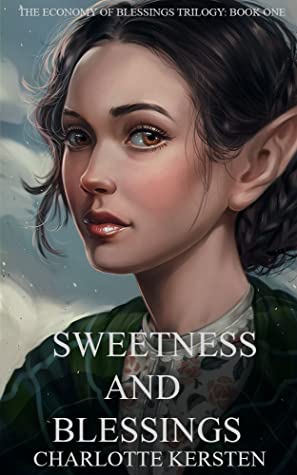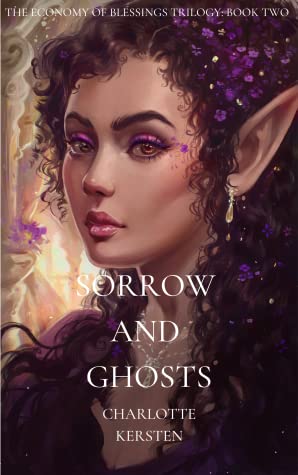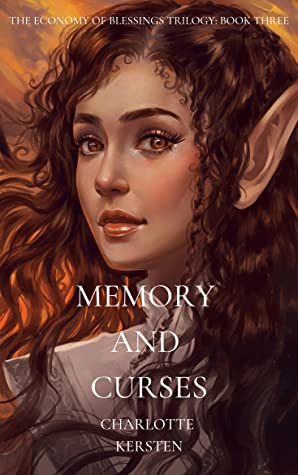"The Economy of Blessings" series review
Overview
Title: The Economy of Blessings
Author: Charlotte Kersten
Subgenre: Gaslamp fantasy
2021 Bingo squares:
- Sweetness and Blessings: Bookclub, 2021 (hm), Self-published (hm), Debut (hm)
- Sorrow and Ghosts: Self-published (hm)
- Memory and Curses: Self-published (hm), Nonbinary character, Witches (arguably)
Recommended if: you want a character-focused story with a protagonist you’ll come to care deeply for in a well-fleshed-out world
Not recommended if: you don’t want to/can’t read a book that spends the majority of its time focusing on a character dealing with spousal abuse
Stars: 5/5
Review
I don’t think I’ve ever read a book or series so filled with compassion for a protagonist as The Economy of Blessings. Charlotte Kersten’s Iraluri starts out in what’s clearly (to the reader, to any outside observer) an abusive marriage, but Iraluri doesn’t know it; not only does her husband keep her from realizing it, but also the oppressive classist and colonialist society that she lives in keeps her from realizing it. But Kersten is here to help Iraluri heal, and while the Economy of Blessings trilogy is one of the most emotionally raw series I’ve ever read, and full of painful scenes and has a bunch of content warnings, it’s also incredibly beautiful, and you can tell Iraluri’s journey is facilitated not just by her in-universe support system but also boundless love and care from the other side of the fourth wall.
Alongside Iraluri’s personal journey - which is really the primary focus of the trilogy - is also a more typical-for-fantasy-novels plot. The Dreonian empire has conquered many of the planes by some unknown means, and their colonialism has hurt many elven races (everyone is an elf, there are no humans). Iraluri is a Miz’ri, once such disadvantaged race, and her magic, called the Economy of Blessings, is now outlawed. But Harlan believes that very magic can lead them to a secret cache of treasure, if only Iraluri could get the ghost Solaufein to give up its location. Instead, Solaufein becomes part of Iraluri’s support system, along with Ser, an Efrusi woman who dresses in men’s clothing and who keeps insisting to Iraluri that love shouldn’t be painful.
The two plots also tie together; part of Harlan’s resentment of Iraluri is due to her Miz’ri race, and she’s not taken seriously in society because of its colonialist, racist, and sexist views. Iraluri has also been educated according to the Dreonian empire’s norms, and her beliefs about herself and her place in the world stem from this indoctrination. The trilogy takes anti-colonialist messages and makes them intimate and personal; it tells the untold harm they can do to a single life.

As the series continues, Iraluri’s investment in the world outside of her marriage grows, and so does the focus of the trilogy; the third book is a true epic fantasy with the fates of nations at stake. But no shortcut is ever taken with Iraluri’s personal journey; she makes progress, but she also backslides, she has doubts, and she recognizes that even with her misfortunes, she has many privileges that others may not, which causes her additional “what if” anxiety.
Unlike some trilogies, you can’t really read book 1 and then decide to stop there; there are time-skips between novels, but other than that, it may well be one single, long novel instead of three separately-published works. Iraluri’s journey is continuous, and you won’t feel satisfied taking a break from it until you reach the very end.
In case you want to read The Economy of Blessings but don’t feel comfortable with not knowing what’s going to happen to Iraluri, after the next divide I’ve outlined (what I think are) the major points of her relationship, so you have an idea of what to expect. There aren’t any spoilers for the non-relationship plot.

Spoilers!!
In case you want to know, going into the trilogy, what to expect out of Iraluri’s journey, here’s a set of spoilers about the spousal-abuse-healing-journey plot, with no spoilers about the rest of the plot:
- In chapter 8 of Sweetness and Blessings, Iraluri says something to Harlan that he takes offense to in the middle of the night, and he throws her out into the cold winter night. She takes refuge at Ser’s and lies to him that she was helped by a stranger who took pity on her. He believes her.
- At the end of Sweetness and Blessings, Harlan discovers that Iraluri went on a walk by herself while he was out. He’s furious, but she finds a way to stave off his fury (related to the rest of the book’s plot).
- In Sorrow and Ghosts, Harlan has Iraluri diagnosed with “hysteria” and hires a nurse to take charge of her. The nurse has a range of advice to help Iraluri, some of which is legitimately helpful (go outside on walks, write about her experiences, find an external support system), and some of which is not (masturbation is sinful, her religion is sinful, etc)
- In Sorrow and Ghosts, Iraluri gets Harlan to leave her alone with her nurse for a summer. Harlan has a geas pearl surgically embedded into her; this magically compels her not to leave their marriage. He also threatens her sister Immy.
- At the end of Sorrow and Ghosts, Iraluri uses her support system to leave their marriage (including having the geas pearl removed).
- At the beginning of Memory and Curses, Iraluri is confronted by a detective who was hired by Harlan to find her. However, she physically fights him off and escapes. She does not physically encounter Harlan or anyone associated with him again after this point.
- At the end of Memory and Curses, Iraluri magically confronts Harlan in a dream and compels him never to do harm again.
Iraluri frequently engages in negative thoughts about herself and later, after the geas pearl surgery, physical self harm. She also experiences nightmares as well as anxiety and flashbacks.

